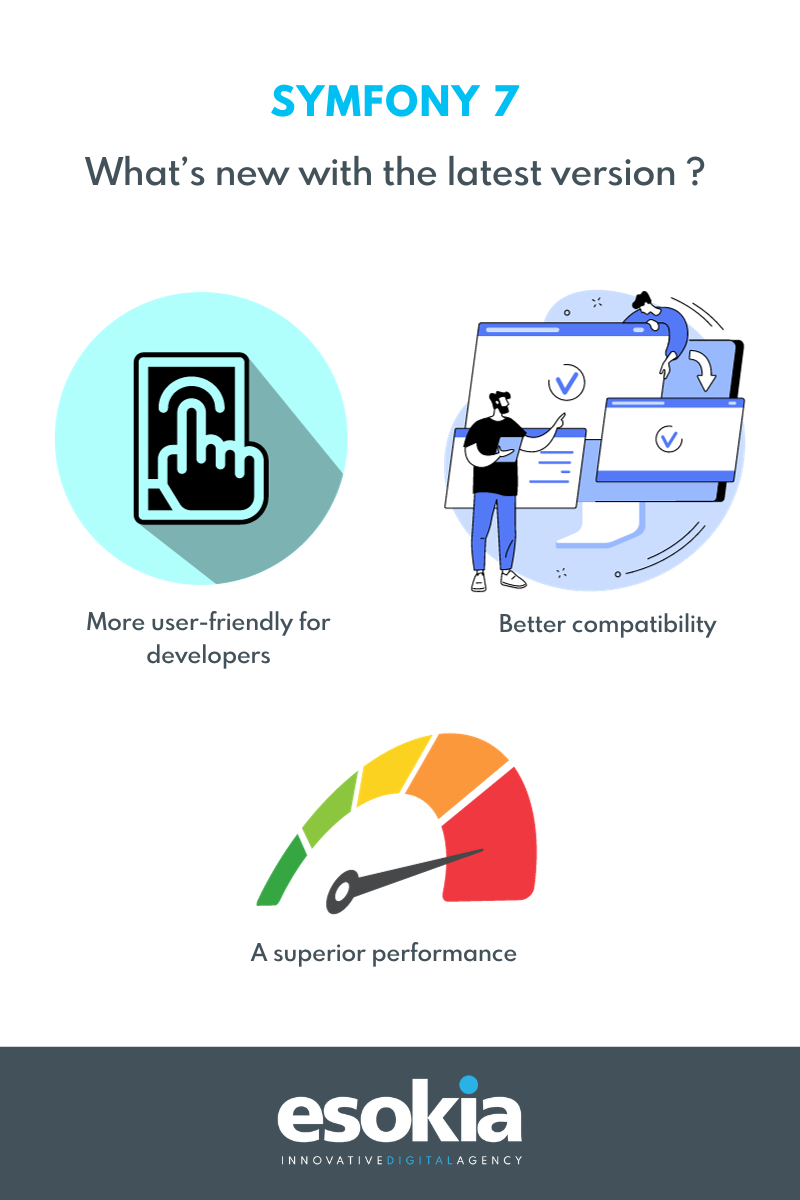What is Symfony?
Symfony is a high-performance PHP framework for web development. It provides a structure and reusable components that help developers create robust, scalable web applications. Symfony 7, the latest version of the PHP framework.
The Symfony framework is based on the MVC (Model-View-Controller) model, a programming approach that facilitates dependency management and encourages a modular code architecture.
When it comes to PHP programming, Symfony is particularly appreciated for its flexibility. It gives developers the freedom to choose the components they wish to use, and is fully configurable to meet specific project needs.
In addition, Symfony is supported by an active community of developers who regularly contribute to improving the framework and providing useful resources.
What's new in Symfony 7?
Symfony 7 brings a host of improvements and new features to web development. Among the most notable are improved performance, greater compatibility with other technologies and enhanced ease of use for developers.
Symfony 7 has been optimized to deliver superior performance. Applications built with Symfony 7 can handle more requests per second, resulting in a better user experience.
In addition, Symfony 7 offers greater compatibility with other technologies, notably Doctrine for database management, and Composer for dependency management.
Symfony 7 has also been designed to be more developer-friendly. It offers more comprehensive documentation, simpler configuration and more powerful development tools, such as Twigs for templates and Bundles for modularity.

Comparison between Symfony 6.4 and Symfony 7
1. Project structure :
Symfony 6.4: The traditional project structure is maintained, with well-established folders for controllers, models, views, etc.
Symfony 7: Symfony 7 promotes a lighter, more flexible project structure, encouraging the use of a component-based approach for greater modularity.
2. Performance:
Symfony 6.4: Although efficient, Symfony 6.4 can still benefit from performance optimizations.
Symfony 7: The focus is on improving performance, through more efficient use of PHP 8.1 and internal enhancements, delivering even faster applications.
3. Compatibility with PHP :
Symfony 6.4: Support for earlier PHP versions, including PHP 7.2+.
Symfony 7: Symfony 7 may require a newer PHP version, such as PHP 8.1, to take full advantage of the latest features and enhancements.
Symfony 7: a number of PHP reusable components
Version 7 of Symfony introduces a series of reusable PHP components. These components are independent code modules that can be used in different parts of the application, or even in different projects. They offer developers great flexibility and facilitate the web development process.
These components cover a wide range of functionalities, from administration of forms to authentication, security, sessions and error handling. Each component is designed to be flexible and configurable, enabling developers to adapt it to their specific needs. What's more, these components are designed to be independent of each other. This means you can use one component without having to use all the others.
This independence allows greater flexibility and facilitates the integration of components into your existing projects. Finally, Symfony 7 components are supported by an active community of developers. This means that new features and enhancements are constantly being added, and you can count on the community's support if you run into problems or need help using the components.
Why migrate to Symfony 7?
Symfony 7 is a robust, scalable PHP framework optimized for web development. Its object-oriented programming and modular structure facilitate code reuse and speed up the development process. Symfony 7 offers an enhanced user experience thanks to improved functionality and a more intuitive interface. It is designed to be easy to use and understand, even for less experienced developers.
With Symfony 7, you can improve code quality, optimize application performance and reduce maintenance costs.
Finally, migration to Symfony 7 is a strategic choice for companies wishing to remain competitive and at the cutting edge of technology. It offers comprehensive documentation and numerous tutorials, making it easy to learn and use this framework.
Why should you choose Esokia for your migration to Symfony 7?
Symfony 4.4 will be obsolete by the end of the year, when Symfony 7 is released.
Many Symfony developers are still working with Symfony 4.4 or earlier versions of the framework. This means that, in addition to the latest Symfony features, the security of your application will no longer be guaranteed once Symfony 4.4 is decommissioned.
Esokia is the partner of choice for your migration to Symfony 7. With solid expertise in web development and PHP programming, our team is capable of managing all aspects of your migration project.
Our developers are trained to work with Symfony bundles and migrate your application to Symfony 7 while guaranteeing code quality and compliance with best development practices.
When you choose Esokia, you also benefit from top-quality technical support. Our team is on hand to resolve any problems you may encounter during your migration to Symfony 7.
Finally, Esokia is renowned for its commitment to customer satisfaction. We strive to provide solutions that meet our customers' expectations and contribute to their success. By choosing Esokia for your migration to Symfony 7, you are choosing a reliable and competent partner.
- Log in to post comments
